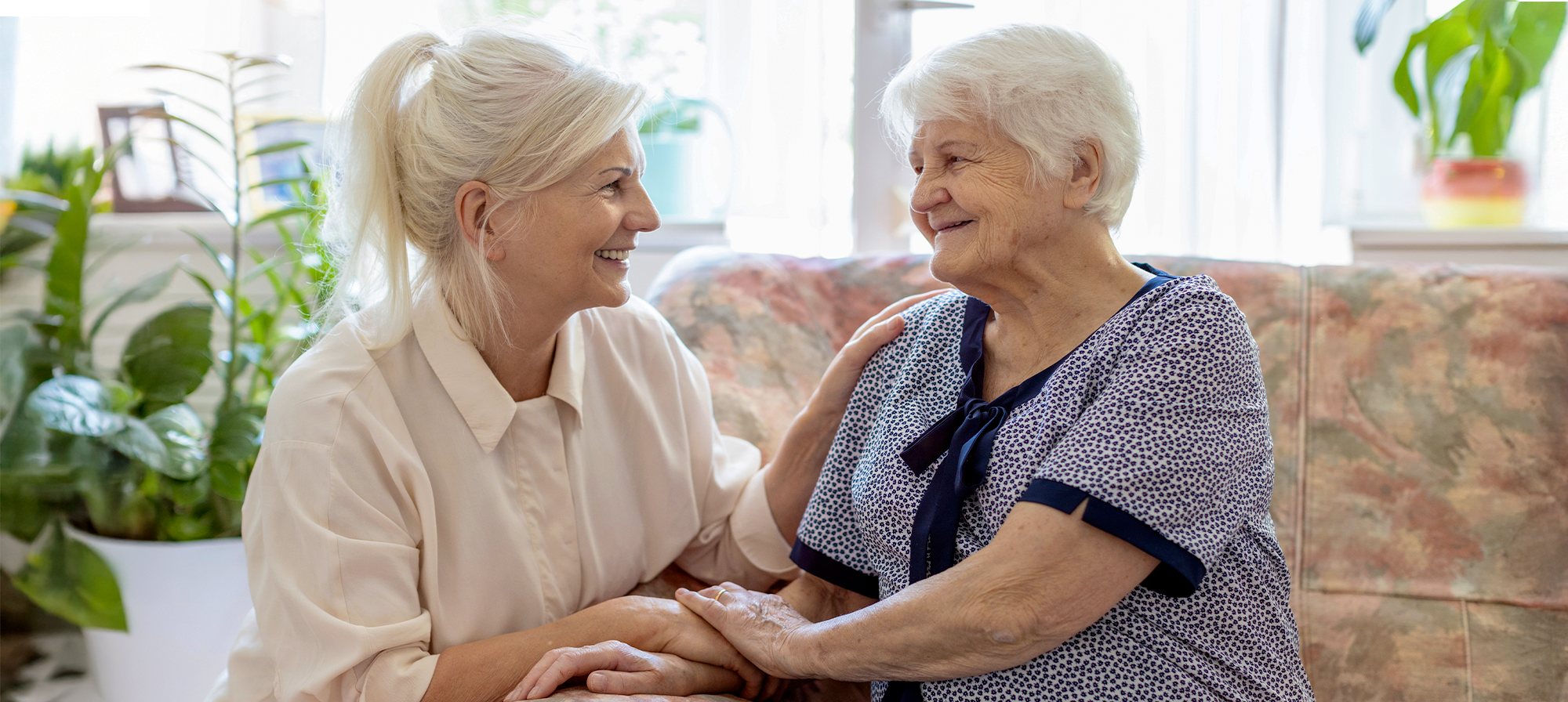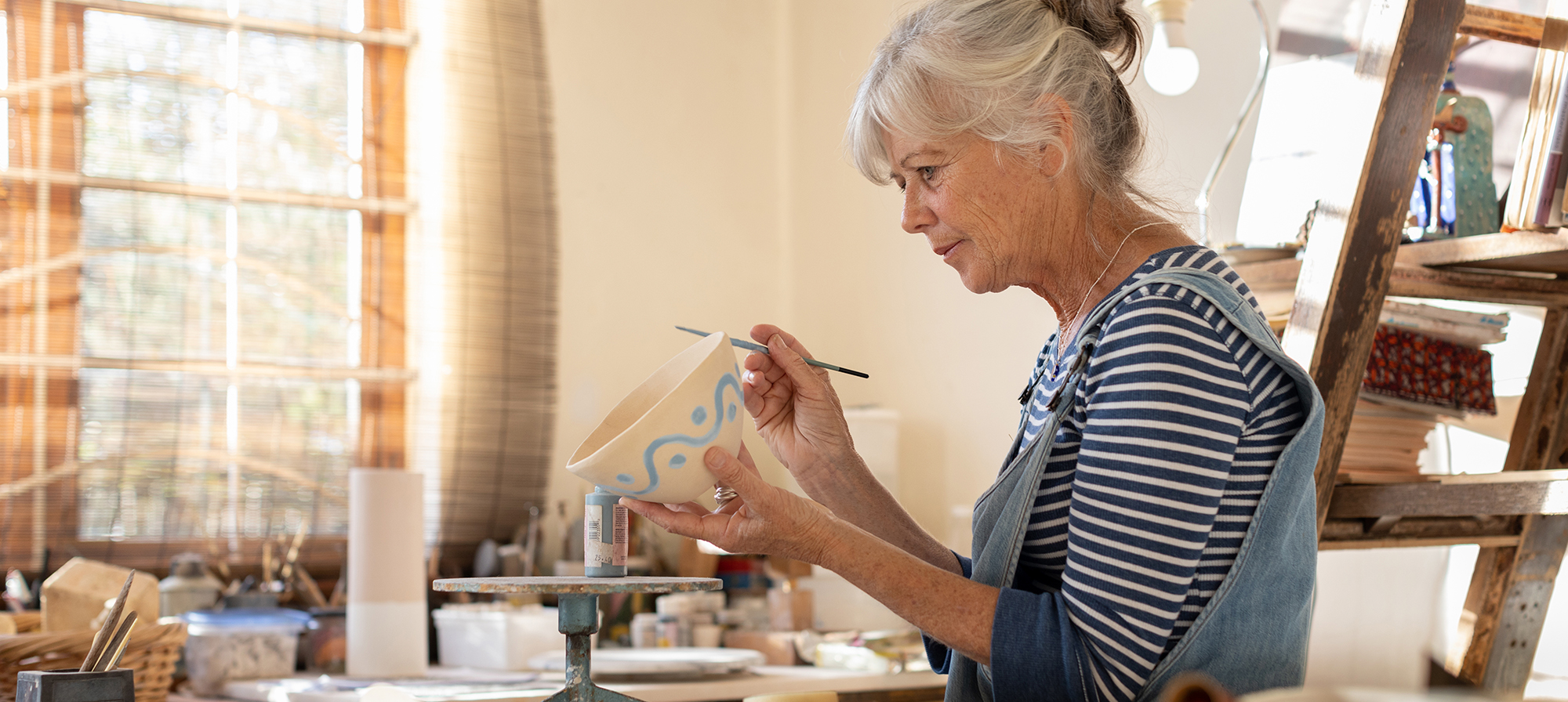Editor’s note: The following is written by special guest author, Sharon Odegaard, a Senior Editorial Specialist at American Specialty Health. Sharon is a seasoned health information writer with many years of experience creating content that encourages people to live a healthy life. Her special interests are nutrition and chronic health conditions. Sharon’s desire to help others guide a loved one through the journey of dementia prompted her to share her own inspirational journey with her mother.
My mother’s phone call that day set off alarm bells. She wanted to talk about “…that sweet girl. You know the one who is always so nice?”
A few questions solved the mystery: She was speaking of her granddaughter Maddie. She had known this teen since birth, as we were all at the hospital and met Maddie when she was only hours old. How in the world could my mother not recall the name of her lovely granddaughter she spent time with every week?
That conversation proved to be the first clear sign of my mother’s dementia. Over the course of the next 3 years, I scrambled to do my best to help my mother as she descended further and further into dementia. Eventually, she lost awareness of all family members except me. She had no understanding of who her friends had been. The people she had cared about so deeply faded to oblivion in her mind.
Navigating the ups and downs of caring for someone with dementia is not for the faint of heart. As a dementia caregiver, through research and trial and error, I learned a lot.
Each person’s condition and circumstances are different. But as I cared for my mother, I did find helpful guidance on what to do and not do, and what to say and not say. Some basics are the same as caring for any elderly person. But dementia adds so many more layers and concerns to an already challenging caregiving journey.

Invaluable lessons learned during my caregiving journey
As my mother’s dementia progressed, I watched as she experienced declines in her ability to think, remember, and reason. Her daily life and activities were affected. She also had a harder time controlling her emotions. At times, her personality became altered.
The progression of dementia happens at different rates for each individual. But once it reaches severe stages, a person may not be able to dress themselves or eat meals. They may not be aware of where they are. They also may no longer recognize family and friends.
I learned the value of working with a doctor shortly after my mother was diagnosed with dementia. They helped explain more about the type of dementia my mom had and what type of symptoms to expect. I also learned a lot about the different kinds of dementia, such as Alzheimer's disease, vascular dementia, or Lewy bodies dementia.
A doctor or neurologist can also tailor treatment and caregiving approaches to daily life for a loved one with dementia, based on their unique diagnosis. Even so, caregiving for anyone with this disease will have similarities.

Even though my mother received outstanding day-to-day care in her retirement facility, I was still responsible for the oversight of that care. I was the liaison between my mother and the staff. I was her spokesperson when she couldn’t articulate her concerns to others. I also coordinated her medical care.
With her diagnosis of dementia, her doctor asked that she move from independent living to the more extensive care provided in assisted living. As her dementia progressed, her understanding of the world faded, and my mother finally moved to a memory care center. Every change along the way called for me to smooth these transitions for my mother, in addition to overseeing her day-to-day life.
 Put effort into brightening the days of your loved one
Put effort into brightening the days of your loved one
Even as my mother’s grasp on all aspects of her life loosened, my highest goal as her daughter and her dementia caregiver was to encourage and help her maintain her dignity. Besides providing physical care, it takes consistent effort to help your loved one feel valued.
There are a number of ways to do this. I included my mom in my activities when possible. I helped her dress. I took her to family events. I would sit and talk and answer the same questions, over and over, while smiling. I learned to keep my own frustration or dismay over her deteriorating cognitive abilities to myself.
I also learned that a loving pup can give someone with dementia a big boost. So, I often took my dog Bailey when I visited my mother. He would run through the front door and jump on her lap as she sat on the sofa, and she would laugh. He naturally loved her and wanted to be with her. And my mother’s joy was always unmistakable.
As my mother’s memory of family members faded, I made sure to print and frame photos of those closest to her. When my daughter had a new baby the last year of my mother’s life, I framed a photo of smiling baby Kylee. My mother didn’t realize this was her great granddaughter. Instead, she would point to the photo and say, “family.”
She kept the picture on her kitchen table and told me she said good morning to the grinning baby every day. I think she left this world happier, knowing that our family had welcomed this tiny little one. Maybe she had some inkling that she was the matriarch of a growing legacy that would carry on when she was gone.

Communication will be tricky and different
Talking with someone as their dementia progresses takes know-how, patience, and effort. The same approach that is successful one day may only frustrate your loved one the next day. So, flexibility is key. Here are some important things I learned along the way:
- Naming objects. Someone with dementia may not remember what to call an object and might describe it instead. One day my mother called to say she needed more of the little sticks with white ends. She couldn’t remember the word “Q-tip.”
- Language difficulties. Forming sentences and completing an idea may grow more and more difficult. Your loved one may also repeat a story over and over in the same conversation. That’s very common. Do not point out that you’ve already heard it, and always resist the temptation to say, “Remember, I just told you that.” Your loved one is not able to remember.
- Focus on feelings rather than facts. It took me some time to learn that it’s better to talk more about feelings and less about facts. At some point, dementia makes it impossible for someone to understand or appreciate logic. Instead of answering questions with the reasons why something can or can’t happen, let your loved one know you understand how they’re feeling.
For example, my mother once expressed her desire to go to Disneyland with me. She couldn’t possibly walk that much and climb into the rides. But instead of pointing out how impractical that dream was, I talked about her memories of Disneyland when she was younger. I reminisced about the times she took my son as a youngster and how he loved those times. She smiled and then moved on to another topic of conversion.
Learning to shift my interactions with my mom in these ways did not come easily. And it may not be easy for you. But with time and patience, it becomes less difficult.

Changes in behavior and ways to handle them
As life becomes more confusing for someone with dementia, reactions such as anger and paranoia may manifest. Here are some helpful tips I learned during my mother’s journey.
Anger
- Make sure your loved one is not angry or grumpy due to pain. People with dementia are not always able to tell you whether something hurts. A visit to a doctor may be needed.
- Focus on feelings and emotions. Try to discern the reason your loved one is lashing out. Is it fear or concern about the future? Or is it loneliness?
- Try not to take angry outbursts personally. This is much easier to say than do. But if you stay calm and speak in a soft voice, you may be able to diffuse the anger.
- Suggest an activity to distract your loved one. Watch a TV show or do a puzzle, for example.
If your loved one is so worked up that you can’t calm them down, take a break. If you are in a care facility and it’s safe to do so, step away. Walk around and let things cool off. This can also occur during a phone call. If you are being yelled at, it may be best to end the call and wait for the anger to fade before talking again.

Delusions and paranoia
- False beliefs. People with dementia often have delusions, which are strongly held false beliefs. They may imagine thefts or think someone is trying to harm them. Delusions can lead to paranoia. You may be called on to listen, show concern, and provide comfort, even though you know the problem is not real.
- Unwarranted fears. Sometimes you can dispel fears. My mother told me once that someone took all her jewelry when she moved apartments. I was able to rummage through her drawers and find all her jewelry buried under a mismatched pile of socks. She immediately calmed down.
Final thoughts
Caring for someone with dementia until end of life can be both a rewarding and trying experience. It calls for creativity and patience. It also means staying strong day to day, through all the ups and downs. Above all, it takes compassion for both your loved one and for yourself.
Keep in mind that you are ensuring the safety and well-being of your loved one. You are helping them keep their dignity and making them feel loved through a confusing and upsetting time of life. Plus, it is something everyone deserves.
I think of one Christmas when my family talked about leaving my mother out of our celebration. After all, she didn’t know it was Christmas. She didn’t even know who most of us were. Still, we decided to make the effort to get her dressed up and bring her to our home.
We set her up in a comfortable chair and put my baby granddaughter in her carrier at my mother’s feet. The baby cooed. My mother talked to her, completely enthralled. Her whole countenance lit up with delight. It was as if these 2 precious beings were speaking a language known only to them.
It turned out that was my mother’s last Christmas. And, despite the darkness of her mind, the joy and light of the season broke through that day. I’m so glad we could give that to her.

Online resources for caregivers
Turn to credible sources for information on caregiving for your loved one with dementia. Here are a few great resources:
National Institute on Aging (NIA), National Institutes of Health Alzheimer’s Caregiving
National Institute on Aging (NIA), National Institutes of Health Alzheimer's Disease Publications
Centers for Disease Control and Prevention (CDC) Caregiving Information From CDC
Not a Silver&Fit® member? Learn more about everything the program has to offer, including more helpful healthy living tips like this, here on our website.
This information is not intended to take the place of regular medical care or advice. Please check with your doctor before using this information or beginning any self-care program. Images used for this article do not depict Sharon Odegaard, her mom, or any members of the Silver&Fit program.
References
Alzheimer's Association. (n.d.). Aggression and anger. https://www.alz.org/help-support/caregiving/stages-behaviors/agression-anger
Alzheimer’s Association. (n.d.). Caregiving. https://www.alz.org/help-support/caregiving
Alzheimers.gov. (2024, May 13). Tips for caregivers and families of people with dementia. https://www.alzheimers.gov/life-with-dementia/tips-caregivers
Alzheimer's Society. (2021, February 26). Delusions, paranoia, and dementia. https://www.alzheimers.org.uk/about-dementia/symptoms-and-diagnosis/delusions
Centers for Disease Control and Prevention (CDC). (2024, September 3). Caregivers of a person with Alzheimer's or a related dementia. https://www.cdc.gov/caregiving/about/?CDC_AAref_Val=https://www.cdc.gov/aging/caregiving/index.htm
Family Caregiver Alliance. (n.d.). Caregiver’s guide to understanding dementia behaviors. https://www.caregiver.org/resource/caregivers-guide-understanding-dementia-behaviors/
Johns Hopkins Medicine. (n.d.). Vascular dementia. https://www.hopkinsmedicine.org/health/conditions-and-diseases/dementia/vascular-dementia
NHS. (2024, April 19). Is there a cure for dementia? https://www.nhs.uk/conditions/dementia/about-dementia/cure
NHS. (2023, July 20). What is dementia? https://www.nhs.uk/conditions/dementia/about-dementia/what-is-dementia/
National Institute on Aging (NIA) (n.d.) Alzheimer’s caregiving. https://www.nia.nih.gov/health/alzheimers-caregiving
National Institute on Aging (NIA). (n.d.). Alzheimer's disease publications. https://order.nia.nih.gov/view-all-alzhemer-pubs
Robinson, L., Wayne, M., Segal, J. (2024, August 22). Alzheimer’s and dementia care: Help for family caregivers. HelpGuide.org. https://www.helpguide.org/articles/alzheimers-dementia-aging/tips-for-alzheimers-caregivers.htm
This article was written by Sharon Odegaard, edited by Gail Olson, and clinically reviewed by Elizabeth Thompson, MPH, RDN, on November 22, 2024.





